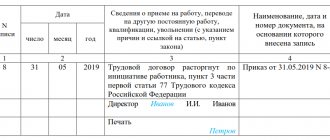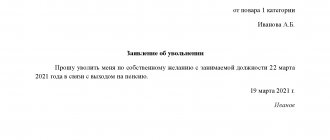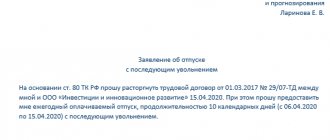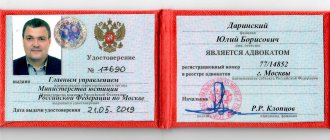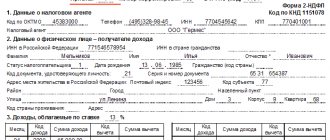Expert consultation
Dismissal at the initiative of the employee is the most common and safest way to part with an employee. Most employers choose this option. But even on this basis for dismissal, controversial situations are possible. Read more about this in the article by our expert Anastasia Chekmareva.
Even if the work record book says “dismissal at his own request,” the employee may claim that he was forced to write a statement. Or the employer may make a mistake in completing the documents. How can this threaten the employer? Labor disputes with the employee and fines for violation of labor laws are possible. To prevent this from happening, let’s consider what to consider when dismissing an employee under clause 3, part 1, art. 77 Labor Code of the Russian Federation.
The basic rule that cannot be violated when dismissing on the initiative of an employee is that an employment contract can be terminated only if the employee submits an application voluntarily. This is confirmed by the explanations of the Supreme Court, for example: paragraph 14 of the Review of Judicial Practice of the Supreme Court of the Russian Federation No. 2 (2021).
The law does not contain special criteria by which compulsion to dismiss can be established. This may include pressure on the employee, threats, or even physical harm. In the event of a trial, the employee must prove that the employer forced him to write a letter of resignation of his own free will (Part 1 of Article 56 of the Code of Civil Procedure of the Russian Federation, paragraph 22 of the Resolution of the Plenum of the Supreme Court of the Russian Federation dated March 17, 2004 N 2).
How do employees prove that they were forced to quit? Let's look at examples from judicial practice.
The wording in the application can serve as evidence of coercion. Let us turn to the Determination of the Judicial Collegium for Civil Cases of the Supreme Court of the Russian Federation dated 04/05/2021 N 5-KGPR20-165-K2.
The employee had a conflict with the employer. In a nervous state, he immediately wrote a letter of resignation of his own free will: “I ask you to dismiss me of my own free will due to a violation of my labor rights by management.” The employee was fired, but later he came to his senses and went to court. He claimed that it was his employer who forced him to write a statement. He also demanded that he be reinstated at work, that the employer recover his average earnings for the period of forced absence, compensation for moral damages, and legal expenses.
The courts of first instance, appeal and cassation sided with the employer. The employee wrote the statement voluntarily and did not withdraw it. The reasons for which the statement was written do not affect the legality of the dismissal. But the Supreme Court did not agree with the lower courts, pointing out that the wording in the statement indicates coercion - the employer forced the employee to write a statement. The case has been sent back for retrial.
Another dangerous wording in a letter of dismissal at the initiative of an employee can be seen in the Determination of the Judicial Collegium for Civil Cases of the Supreme Court of the Russian Federation dated 02/01/2021 N 14-КГ20-14-К1.
The kindergarten employee formulated her resignation letter as follows: “I ask you to dismiss me from my position at my own request due to the psychological pressure exerted on me by the kindergarten administration, the creation of a conflict situation regarding my appeals to the labor dispute inspectorate, the cruel treatment of my son attending this educational institution.”
The Supreme Court recognized the employee’s argument that she did not want to quit her job as justified. From the contents of the resignation letter it follows that it was given involuntarily so that the management of the organization would stop putting psychological pressure on her.
If it does not follow from the wording that the employee wrote the statement under compulsion and at the same time he provided it to the employer and did not withdraw it before the date of dismissal, then the courts most often side with the employer. One example of a court decision in favor of the employer: Determination of the Eighth Court of Cassation of General Jurisdiction dated January 14, 2020 N 88-1748/2020
In practice, there are situations when, in order to avoid dismissal on compromising grounds (disciplinary action, unsatisfactory test results, etc.), employees write a statement of their own free will. According to the courts, this does not indicate coercion to dismiss. Let's consider the Ruling of the Seventh Court of Cassation of General Jurisdiction dated May 19, 2020 in case No. 88-8418/2020.
The employee was fired at her own request. But after the dismissal, she went to court demanding that the dismissal be declared illegal. The woman explained that she wrote the statement to avoid dismissal for an unsatisfactory test result. The courts supported the employer: filing a resignation letter of one’s own free will in order to avoid dismissal for another reason does not mean coercion.
Application for voluntary resignation
Labor legislation does not establish special requirements for the form and content of the application, but there are several nuances that will help the employer avoid risks. First of all, you should pay attention to the content of the application. Desirable wording: “I ask you to fire me of your own free will.” The text of the application can be written by hand or provided in printed form, but a mandatory requisite of the application is the personal signature of the employee.
The application must include the date of dismissal. If the employee does not put a date on the application, we recommend asking him to enter the date in person or rewrite the application. If the application does not indicate the date or it was entered by the employer independently, then there is a risk that the court will declare the dismissal illegal, for example: Appeal ruling of the St. Petersburg City Court dated March 15, 2018 No. 33-5761/2018 in case No. 2-6966/2017.
Notice of dismissal
According to the general rule, an employee must notify the employer of voluntary dismissal at least two weeks in advance (Part 1 of Article 80 of the Labor Code of the Russian Federation).
The law establishes special deadlines for certain categories of workers:
- for workers during the testing period - no later than three days in advance (Part 4 of Article 71 of the Labor Code of the Russian Federation);
- for employees who have entered into an employment contract for a period of up to two months - three calendar days in advance (Part 1 of Article 292 of the Labor Code of the Russian Federation);
- for seasonal workers - three calendar days in advance (Part 1 of Article 296 of the Labor Code of the Russian Federation);
- for the head of an organization - at least one month (Article 280 of the Labor Code of the Russian Federation).
The specified period begins the next day after the employer receives the employee’s resignation letter. Please note: the date on the application and the date the employer received the application may not match. We recommend recording receipt of the application in a special journal to avoid controversial situations. The period is not interrupted by vacation or temporary disability. The date of dismissal may also fall within the specified periods (part 3 of article 14, part 1 of article 80 of the Labor Code of the Russian Federation, Letter of Rostrud dated 09/05/2006 N 1551-6).
If the employee does not want to work the specified period, or you want to say goodbye to him before the expiration of the notice of dismissal, then this is possible, but only by mutual agreement of the parties. This follows from part 2 of article 80 of the Labor Code of the Russian Federation.
There are situations when an employer is obliged to dismiss an employee on the day the application is received. Such situations include (part 3 of Article 80 of the Labor Code of the Russian Federation, paragraph “b”, paragraph 22 of the Resolution of the Plenum of the Supreme Court of the Russian Federation dated March 17, 2004 N 2):
- impossibility of continuing work (enrollment in an educational institution, retirement, or the presence of other valid reasons due to which the employee cannot continue to work, for example, sending a husband (wife) to work abroad, to a new place of duty);
- cases of established violation by the employer of labor legislation and other regulatory legal acts containing labor law norms.
Rights and obligations of the employer
According to the law, a person who wants to quit submits an application to management, specifying the date from which he intends to stop working. Notice periods for dismissal vary. As a general rule, the application must be written at least 2 weeks before the expected date of departure. This time is given to the business to find a replacement for the departing employee. But how much to work out when terminating an employment contract at one’s own request is decided directly by the employer. The law allows him to release a subordinate without working, but there are categories of employees whom the employer is obliged to release on the dates indicated in their applications.
For persons who retire or switch to full-time study, the terms of dismissal at their own request are not established; the contract with them is terminated taking into account the day specified in the application.
Dismissal of a maternity leave at her own request occurs according to the general rules, but she is not obliged to work.
Read more: Dismissal of a maternity leaver
If a part-time worker leaves, it is necessary to clarify whether the external or internal employee is leaving, whether he is leaving his main or additional job. It depends on what to write in the work book and to whom.
Read more: Dismissal of a part-time worker
In relation to the outgoing director, the procedure is more complex and depends on whether he is an employee, a shareholder or the sole founder.
Read more: CEO Statement
Methods of notice of dismissal
The most common way to submit a resignation letter is for the employee to hand it over to the employer in writing in person, but other options are also possible.
For example, the application can be sent by mail. This method of dispatch is possible, which is confirmed in the letter of Rostrud dated 09/05/2006 N 1551-6.
The courts also recognize sending an application by telegram as legal, which is confirmed by judicial practice, for example: Determination of the Moscow City Court dated January 23, 2017 No. 4g-0001/2017. Please note that the telegram must be certified by the operator. According to clause 108 of the Order of the Ministry of Information Communications of Russia dated September 11, 2007 N 108 o means that the sender’s signature is certified by the telecom operator. If there is no mark, then risks are possible, since it is difficult to verify that the telegram was sent by the employee personally.
In practice, employees also use such a method as sending an application by e-mail. The courts have ambivalent views on this option. Let's consider the Determination of the First Cassation Court of General Jurisdiction dated March 23, 2020 No. 88-6776/2020 in case No. 2-591/2019.
The employee sent the employer a letter of resignation by email with a request to send him a work book to the specified address. The employer did not fire him because he did not receive the original application. The employee went to court with demands to issue a work book and wages for the delay in issuing it. The employee's claim was granted. The court noted: the sending by an employee to the employer of a letter containing this expression of will in electronic form is one of the forms of the employee’s written statement submitted not on paper, but in electronic form.
A similar approach can be seen in the ruling of the Sixth Court of Cassation of General Jurisdiction dated May 14, 2020 in case No. 88-10258/2020. The employee sent a photograph of his resignation letter of his own free will using instant messenger, and based on the photograph of the petition, he was fired. The court declared the dismissal legal. The employee expressed his will, the application was not withdrawn.
But there is also an opposite position, for example, the Determination of the Second Cassation Court of General Jurisdiction dated October 22, 2020 No. 88-19870/2020 in case No. 2-3394/2019. The resignation letter was sent to the employer by email, but the employee claimed that she did not send it. The court sided with the employee on the grounds that the application was not signed with an electronic digital signature and there was no reliable evidence that the resignation letter was sent.
Since the courts have not yet developed a unified position on this issue, we recommend asking the employee to duplicate the application on paper and provide it to the employer in person or send it by mail.
The employee withdrew his resignation letter
The employee has the right to withdraw the application at any time before the end of the calendar day when the dismissal should be formalized (part 4 of article 80, part 4 of article 127 of the Labor Code of the Russian Federation, Determination of the Supreme Court of the Russian Federation dated August 10, 2012 N 78-KG12-10).
There are exceptions:
- If another employee is invited to take the place of an employee, whom the employer does not have the right to refuse by force of law. For example, by virtue of Part 4 of Article 64 of the Labor Code of the Russian Federation, it is prohibited to refuse to conclude an employment contract to employees invited in writing to work by way of transfer from another employer, within one month from the date of dismissal from their previous place of work.
- If the employee wrote an application for leave with subsequent dismissal. If such leave is granted, the employee has the right to withdraw the application only before it begins (Part 4 of Article 127 of the Labor Code of the Russian Federation).
Let's consider the Determination of the Second Cassation Court of General Jurisdiction dated October 29, 2020 in case No. 88-22327/2020. The employee wrote an application for leave with subsequent dismissal of his own free will. On the first day of his vacation, he withdrew his application. The employment contract was terminated and the employee went to court. The court sided with the employer and declared the dismissal legal.
Withdrawal of a resignation letter at your own request, like the application itself, can be sent in various ways, including by mail. But in this case, there is a risk that the revocation will come later than the date of the application, and at that time the employment contract will already be terminated.
Judicial practice on this issue is ambiguous. Most often, the courts side with the employee. Let's consider the Determination of the Ninth Court of Cassation of General Jurisdiction dated November 14, 2019 N 88-67/2019.
The employee wrote a letter of resignation of her own free will. Later she changed her mind and sent a review by post. When the review was delivered to the employer, the dismissal had already been formalized. The court sided with the worker. The employer's argument that the notice was received later due to the slowness of the postal service was not accepted by the court. According to Part 4 of Article 80 of the Labor Code of the Russian Federation, before the expiration of the notice period for dismissal, the employee has the right to withdraw his application at any time.
There is also an opposite position that can help the employer protect his rights: Appeal ruling of the Supreme Court of the Chuvash Republic dated September 29, 2014 in case No. 33-3461/2014.
The employee sent the revocation of the application by mail, and the employer received it after dismissal. The court sided with the employer, citing the dishonesty of the employee, who knew for certain that the mail containing the withdrawal of the application would not reach the addressee before the date of dismissal, and therefore abused his right.
If the employee has withdrawn the application for dismissal, and the employer has already issued the corresponding order, made an entry in the work book and reflected information about the dismissal in the information about work activity, then in this case the order should be canceled, the entry in the work book must be declared invalid and a corrective form must be submitted to the Pension Fund of the Russian Federation. “Information on the labor activity of a registered person (SZV-TD).”
Please note that if, after the expiration of the period specified in the application, the dismissal is not formalized, but the employee continues to work and does not insist on this procedure, then the employment contract continues (Part 6 of Article 80 of the Labor Code of the Russian Federation).
The nuances of terminating a contract
It is impossible to terminate a working relationship at the initiative of the employer when a person is sick or on vacation. But an employer is allowed to fire a person who wants to leave during his vacation. But in such a situation, it is more difficult to be reinstated at work if the worker has withdrawn his resignation letter. During the month's vacation period, the employer could well find a new employee and have time to conclude an employment contract with him, so he no longer has the right to hire the previous one.
The general rules on how to correctly dismiss an employee at his own request apply even if the notice period for resignation coincides with sick leave. And it doesn’t matter that at the time of its completion the employee is no longer registered in the organization, his sick leave will be paid according to all standards.
Registration of dismissal at your own request
The procedure for dismissal at the initiative of an employee does not differ from similar procedures for other reasons. It is necessary to issue an order, make an entry in the work book, and also enter information into the information about work activities and send the information to the Pension Fund. As a rule, the order is issued in form No. T-8, but the employer can develop his own form of such an order. The main thing is that the content complies with legal requirements.
The order in the column “Grounds for termination of an employment contract” states: “Termination of an employment contract at the initiative of the employee, paragraph 3 of part one of Article 77 of the Labor Code of the Russian Federation.” If, based on the reason for dismissal, the employee is entitled to benefits and benefits (for example, retirement, transfer of the husband to work in another area), then they must be reflected in the order. The employee must be personally familiarized with the order, sign under it, and if this is not possible, then a corresponding entry is made on the order (Part 2 of Article 84.1 of the Labor Code of the Russian Federation).
On the day of dismissal, the employer is obliged to issue the employee a work book or provide information about his work activity. Please note: if the employee has chosen to maintain a work record book, the employer is not obliged to provide information about work activities. He can receive them at the MFC, Pension Fund or on the State Services portal (Letter of the Ministry of Labor of Russia dated June 16, 2020 N 14-2/OOG-8465). Upon a written application from the employee, the employer is obliged to provide him with duly certified copies of documents related to work (Part 4 of Article 84.1 of the Labor Code of the Russian Federation).
The calculation occurs according to general rules. On the day of dismissal, it is necessary to pay wages, compensation for unused vacation, as well as other amounts due. Severance pay is paid only if it is provided for by the employment contract, collective agreement or local regulations of the employer (Part 1 of Article 140 of the Labor Code of the Russian Federation).
There is an exception if leave is granted followed by dismissal. At least three calendar days before the start of the vacation, vacation pay is paid, and other amounts due are paid on the last day of work before going on vacation (Part 5 of Article 80, Part 9 of Article 136 of the Labor Code of the Russian Federation, Letter of Rostrud dated May 14, 2020 N PG/20884- 6-1).
Calculations
A person who decides to leave work on his own is usually not paid severance pay (however, the employer has the right to provide for this payment by local regulations). He will be given a salary (part of it) for the time worked. But the employee is required to pay compensation upon dismissal of his own free will, for example, for unused vacation, and bonuses if they are provided for in the employment agreement.
Read more: Calculations upon dismissal
Consequences of failure to comply with the dismissal procedure at the employee’s initiative
Failure to comply with the procedure for voluntary dismissal or forcing an employee to resign may result in negative consequences for the employer. The employee can go to court. If the court decision is made in favor of the employee, the employer will have to:
- Pay average earnings for the period of forced absence;
- Pay compensation for unused vacation days due during the period of forced absence, if this requirement was stated;
- Pay compensation for moral damage if this claim has been made;
- Reimburse the employee's legal costs, including the costs of a representative in court, if this claim has been made;
- Pay state fees in the amount calculated from the amounts awarded for payment;
- Reinstate the employee if he made such a demand.
Also, the employer may be held liable for violation of Labor legislation under Article 5.27 of the Code of Administrative Offenses of the Russian Federation, a fine for legal entities - from 30,000 to 50,000 rubles.
The ConsultantPlus legal reference system will help you avoid negative consequences in the dismissal procedure. In ConsultantPlus you can find step-by-step instructions on this procedure, samples of filling out personnel documents, as well as collections of current judicial practice on labor disputes.
